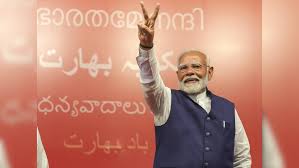
The stage is set for Narendra Modi to make history as he is sworn in for his third consecutive term as Prime Minister of India, becoming the first person to do so since former Prime Minister Jawaharlal Nehru. Alongside PM Modi, the members of his council of ministers will also take their oath in a ceremony that promises to highlight the new dynamics of the Modi 3.0 cabinet.
Several prominent leaders from both the BJP and its allied parties are expected to be part of the new cabinet. Among the BJP leaders likely to retain or receive ministerial positions are:
Nirmala Sitharaman
Amit Shah
Rajnath Singh
Manohar Lal Khattar
In addition, key figures from BJP’s allies are also expected to be included, reflecting the coalition’s broad-based support:
HD Kumaraswamy (JD(S))
Ramdas Athawale (Republican Party of India)
Jayant Chaudhary (Rashtriya Lok Dal)
Increased Representation from Allies
Given that the Bharatiya Janata Party (BJP) is falling short of an outright majority this time, there is a significant chance that more leaders from allied parties will be seen in the council compared to the previous term. This inclusion strategy underscores the BJP’s reliance on its coalition partners to form a stable government.
Among the allies, leaders from the Telugu Desam Party (TDP) and the Janata Dal (United) [JDU] are expected to play crucial roles:
Chandrababu Naidu (TDP)
Nitish Kumar (JDU)
Cabinet Composition and Strategic Importance
The inclusion of these leaders highlights the strategic importance of various states and political factions in the Modi government’s plan for governance. The expected cabinet composition aims to balance the representation of key states and communities, ensuring a more inclusive approach.
While the final list of ministers will be confirmed during the swearing-in ceremony, the speculated names indicate a mix of experienced leaders and new entrants. This blend is aimed at bringing both continuity and fresh perspectives to the administration.
Modi’s third term as Prime Minister marks a significant chapter in Indian political history. His leadership style and policy directions are anticipated to continue shaping the country’s future, with the new cabinet playing a pivotal role in implementing the government’s agenda.

